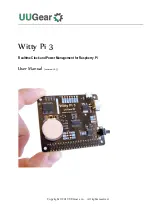
Chengdu Ebyte Electronic Technology Co., Ltd. E19-433M30S User Manual
Copyright ©2012–2018
,
Chengdu Ebyte Electronic Technology Co.,Ltd. 7
6.FAQ
6.1 Communication range is too short
The communication distance will be affected when obstacle exists.
Data lose rate will be affected by temperature, humidity and co-channel interference.
The ground will absorb and reflect wireless radio wave, so the performance will be poor when testing near ground.
Sea water has great ability in absorbing wireless radio wave, so performance will be poor when testing near the sea.
The signal will be affected when the antenna is near metal object or put in a metal case.
Power register was set incorrectly, air data rate is set as too high (the higher the air data rate, the shorter the
distance).
The power supply low voltage under room temperature is lower than 2.5V, the lower the voltage, the lower the
transmitting power.
Due to antenna quality or poor matching between antenna and module.
6.2 Module is easy to damage
Please check the power supply source, ensure it is 2.0V~3.6V, voltage higher than 3.6V will damage the module.
Please check the stability of power source, the voltage cannot fluctuate too much.
Please make sure antistatic measure are taken when installing and using, high frequency devices have electrosta tic
susceptibility.
Please ensure the humidity is within limited range, some parts are sensitive to humidity.
Please avoid using modules under too high or too low temperature.
6.3 BER(Bit Error Rate) is high
There are co-channel signal interference nearby, please be away from interference sources or modify frequency a nd
channel to avoid interference;
Poor power supply may cause messy code. Make sure that the power supply is reliable.
The extension line and feeder quality are poor or too long, so the bit error rate is high;
7.Production guidance
7.1 Reflow soldering temperature
Profile Feature
Curve characteristics
Sn-Pb Assembly
Pb-Free Assembly
Solder Paste
Solder paste
Sn63/Pb37
Sn96.5/Ag3/Cu0.5
Preheat Temperature min
(
Tsmin
)
Min preheating temp.
100℃
150℃
Preheat temperature max (Tsmax)
Mx preheating temp.
150℃
200℃
Preheat Time (Tsmin to Tsmax)(ts)
Preheating time
60-120 sec
60-120 sec
Average ramp-up rate(Tsmax to Tp)
Average ramp-up rate
3℃/second max
3℃/second max
Liquidous Temperature (TL)
Liquid phase temp.
183℃
217℃
Time
(
tL
)
Maintained Above
(
TL
)
Time below liquid phase line
60-90 sec
30-90 sec
Peak temperature
(
Tp
)
Peak temp.
220-235℃
230-250℃





























